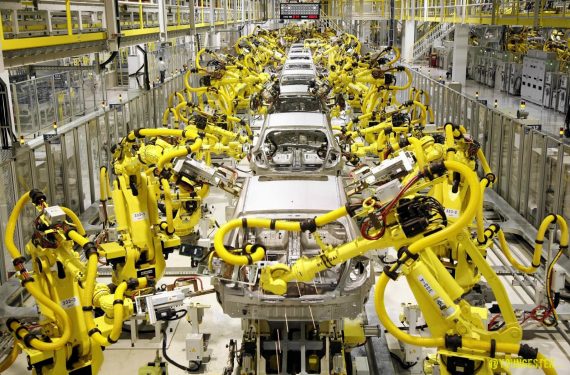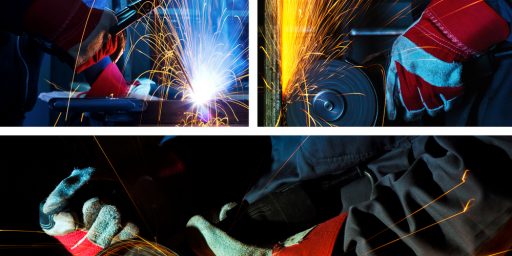The Rise Of The Robots And The Decline Of The Middle Class
Technology continues to make more and more jobs unnecessary and irrelevant. And the consequences are going to be widespread.
When you read about the dangers of artificial intelligence in the popular media, most of the writing focus on the dangers of superintelligent machines developed by man who decided on their own that they know better than humans how to run the world, or of something as simple as tiny single-celled artificial nanotechnology that becomes a threat to the environment that man simply can’t control. Given the current state of AI, it seems as though we are fortunately far away from being able to bring about either of these dystopias, at least for now, given the current state of technology and the expected rates of growth in the field. To some extent, it seems clear that the risk of these dangers is most likely overstated. For one thing, as long as humanity continues to have the power to turn machines off the possibility of some all-encompassing global intelligence remains fairly low. In addition, researchers are working on safeguards that would hopefully prevent such things from happening. At the very least, it seems clear that these dangers will remain, for the time being, between the pages of a science fiction novel and may not be as realistic as many dystopian views of the future would have you believe. As a recent article in Wired notes, though, the more immediate concern is far closer in time and far more likely to happen, and in fact has been in the works for about the past thirty years now:
At a time when the Trump administration is promising to make America great again by restoring old-school manufacturing jobs, AI researchers aren’t taking him too seriously. They know that these jobs are never coming back, thanks in no small part to their own research, which will eliminate so many other kinds of jobs in the years to come, as well. At Asilomar, they looked at the real US economy, the real reasons for the “hollowing out” of the middle class. The problem isn’t immigration—far from it. The problem isn’t offshoring or taxes or regulation. It’s technology.
In the US, the number of manufacturing jobs peaked in 1979 and has steadily decreased ever since. At the same time, manufacturing has steadily increased, with the US now producing more goods than any other country but China. Machines aren’t just taking the place of humans on the assembly line. They’re doing a better job. And all this before the coming wave of AI upends so many other sectors of the economy. “I am less concerned with Terminator scenarios,” MIT economist Andrew McAfee said on the first day at Asilomar. “If current trends continue, people are going to rise up well before the machines do.”
McAfee pointed to newly collected data that shows a sharp decline in middle class job creation since the 1980s. Now, most new jobs are either at the very low end of the pay scale or the very high end. He also argued that these trends are reversible, that improved education and a greater emphasis on entrepreneurship and research can help feed new engines of growth, that economies have overcome the rise of new technologies before. But after his talk, in the hallways at Asilomar, so many of the researchers warned him that the coming revolution in AI would eliminate far more jobs far more quickly than he expected.
Indeed, the rise of driverless cars and trucks is just a start. New AI techniques are poised to reinvent everything from manufacturing to healthcare to Wall Street. In other words, it’s not just blue-collar jobs that AI endangers. “Several of the rock stars in this field came up to me and said: ‘I think you’re low-balling this one. I think you are underestimating the rate of change,'” McAfee says.
(…)
In the end, no one left Asilomar with a sure way of preventing economic upheaval. “Anyone making confident predictions about anything having to do with the future of artificial intelligence is either kidding you or kidding themselves,” McAfee says.
That said, these researchers say they are intent on finding the answer. “People work through the concerns in different ways. But I haven’t met an AI researcher who doesn’t care,” Etzioni says. “People are mindful.” But they feel certain that preventing the rise of AI is not the answer. It’s also not really possible—a bit like bringing those old manufacturing jobs back.
Technology taking jobs away from human beings has been an issue throughout human history ever since automobiles displaced the horse-drawn carriage business and light bulbs turned candles and other forms of light from an essential item to a decorative one that was no longer as widely in demand as it once used to be. One of the largest such displacements occurred when agriculture became far more mechanized and sent people into the major cities looking for work in the emerging and growing factories that created everything from automobiles and appliances to the steel beams used to build many of the world’s most majestic buildings and bridges. For the most part, though, when technology caused one industry to displace another, it led to the creation of new industries that in many cases employed far more people at far better wages than what it had displaced. As a result of this, advances in technology have historically been good for the economy and good for the American public. Thanks to the factory jobs that the Industrial Revolution created and then the office jobs that came about in the wake of the Great Depression and World War II, the American middle class came into existence and managed to live a pretty comfortable life for several decades starting in the 1950s.
At some point starting roughly in the 1980s, though, technology went from something that expanded opportunity for jobs to one that made more and more jobs unnecessary. Robots have replaced human beings on assembly lines for automobiles, appliances, and so much more, and they are able to do their jobs faster, more accurately, and less expensively to such a great extent now that it takes far fewer people to make something like a car than it did 30 or 40 years ago, and the cars themselves are safer, more environmentally friendly, and provide more value for the dollar than the automobiles built primarily with human labor. The same is true in a whole host of other industries. Additionally, technology has increasingly made many jobs once held by human beings less necessary, if not eliminated them entirely. These technological advances are far more responsible for the loss of manufacturing and other jobs than the off-shoring that Donald Trump and his supporters complain about, and even if Trump does succeed in his efforts to get companies like Ford to forgo plans to move plants to places like Mexico and China, the truth of the matter is that the majority of those manufacturing jobs are gone and not coming back. The same is true for the office jobs that have displaced by technology, the jobs in the fast food industry quickly being displaced by the use of self-order kiosks at places such as McDonald’s (and even now coming to your local Applebees, T.G.I. Fridays, or Red Robin thanks to the rise of similar table-side devices in the casual dining industry), and of jobs for taxi drivers (already threatened by the rise of Uber and Lyft) and truck drivers thanks to the impending rise of driverless vehicles.
Sooner rather than later, America and the rest of the world is going to have to figure out how to deal with the fact that technology has made human labor far less necessary and that only promises to expand in the future. To some extent, of course, the jobs that are lost are being replaced by jobs in high-technology that are needed to build and develop the machines that are replacing the things people used to do. Those jobs usually require specialized training and knowledge, though, and are far less numerous than the number of jobs they are displacing. The service industry is another avenue for people to pursue, of course, but even there technology is taking the place of human beings in a variety of ways that make it possible for fewer people to do the same amount of work more efficiently and at a quicker pace. Some industries will remain immune to the rise of technology for a while longer, but even in areas such as medicine and the law, technology is having an impact on how many support personnel are needed to maintain the level of service that people have come to expect. These are trends that are only going to continue, and they are going to have profound effects on the lifestyles of the middle class across the world. That’s something that no amount of bluster from the likes of Donald Trump will be able to fix.







Excellent piece Doug.
Unfortunately for us as Americans, a serious discussion of technology, jobs and economic displacement is nearly impossible. On the campaign trail this topic is addressed and discussed as “I’m going to bring back those lost jobs!” Frustration among working Americans with these 30 to 40 year trends has brought us to this toxic solution, Donald Trump.
It’s very worrisome. There used to be many honorable and useful jobs for people with little formal education and, to be blunt, limited intellectual capacity. There are people who of course can be re-trained or re-directed. But you can’t make a neurosurgeon or an astrophysicist or a chemical engineer or a cardiologist or a math professor or a scientific software designer out of someone with an I.Q. of 90. It’s not going to happen. We have to face that and find a decent way to solve the problem.
As I see it there are two problems, one economic that at least in theory could be solved and one social that I have no idea how to deal with.
The economic problem, of course, is the possibility of a large jobless population that would need to find a way to support itself, One answer to this could be proposals such as the Univeral Basic Income, which would be a benefit available to all citizens and would provide a sufficient income for at least the basics in life. It’s an idea that even some libertarian economists have advocated as a possible alternative to the way we currently approach welfare that could, in the end, actually end up being less expensive than modern day social welfare programs.
The social problems, though, are harder to solve and consist of the issue of large populations of young, mostly male, idle populations that have essentially nothing to do all day. Work of some kind serves a purpose in life for most people that goes beyond the fact that it’s necessary to make the money to live. It gives people purpose in life and a reason to get out of bed during the day. What kind of society would be created when there’s such a large population that is basically doing nothing all day? I don’t know, but it strikes me that it could be something that poses a danger to social order down the line.
@Doug Mataconis:
Indeed. To put it in the simplest possible terms: Most people need a reason to get out of bed in the morning.
@Doug Mataconis: we need to legalize pot fast. Nothing quite helps solve the problem of wanting a purpose to your life like pot.
@Doug Mataconis: First, it isn’t just technology. Anyone who discusses economic matters needs to read Thomas Piketty, Capital in the Twenty-First Century. He has historical data showing that accumulated capital has typically run around 500 or 600% of GDP and that as a result return on capital has historically been larger than return on labor. This was massively disrupted by the destruction of capital in the World Wars. The result was a brief era of labor dominance. But we are reverting to the norm, high ratios of accumulated capital to GDP and quite probably approaching dominance of society by inherited wealth. Piketty’s style is more than a bit tedious, I suggest you skim over the third, fourth, and fifth demonstrations of each point.
I would argue with your claim we have an economic problem. As you note, there are simple solutions to the economics. What we have is a political problem. Any economic solution will require that rich people pay taxes. Rich people care about nothing so much as not paying taxes. If there’s one thing we know about politics it’s that rich people get what they want. We already see politics heavily influenced by greed and ideology driven billionaire political naifs.
Doug, excellent article. Robots are part of a broader category that makes it economically advantageous to automate lower volume products. Although it has been true for decades that the production of things like disposable razors, boxes of Kleenex and cans of Coke are so automated that the cost of labor for producing them and packaging them is insignificant. Even in a US plant you could eliminate labor entirely and not make a significant impact on their cost. But robots, machine vision systems similar advances has made it easier to automate much lower volumes of product.
And you are dead on about AI. Twenty years ago I was in the Pacific Northwest and saw two crops that ‘couldn’t be picked by machine’, asparagus and hops because, each for its own reason, picking required a lot of dexterity and judgement. At the time, it made sense to me. But I’m fairly certain that today automated pickers could be developed for both, and eventually will. Heck, we are not far off from sending unmanned tractors in the fields to plow, plant and harvest our major crops.
I don’t see any kind of Universal Basic Income coming to be in our country — we have a belief that the poor are poor because of moral failings, and a mass welfare state just isn’t in our future without a massive cultural change.
If we managed that, though, we could find ways to keep people from being idle. A UBI is going to naturally reach some uninteresting level of lifestyle, and people being people are going to want more. Consider some kind of negative sales tax to subsidize people who are creating more — you would begin encouraging arts, practical crafts, bespoke clothing, etc., and creating a subsidized Etsy Economy.
I don’t know where the money comes from though, without massive income tax increases (personal and corporate), and I don’t see that happening either.
We are rapidly approaching science fiction territory now. Yes, it is an economic and a political problem, but as @DougMataconis notes in this excellent piece, the bigger problem will be what to do with a huge number of humans who will have lost the organizing principle of their lives. It’s a fascinating problem, and I don’t think we have a clue how it will come out in the end. I’m a horrible workaholic and I have no idea what I’d do if I didn’t work. Although @Gustopher offers an excellent first step.
AI researchers have been not taking things seriously for sixty years.
Yet technology isn’t destroying manufacturing jobs in Japan or Sweden or Germany, which use the very latest technologies in their industrial production. Strangely, manufacturing employment is more-or-less steady in countries with actual industrial policies.
The problem with this notion is that manufacturing productivity has not kept up with historical rates of growth. It is incoherent to claim technology is destroying manufacturing jobs in a period where average productivity growth has been lower since 1979. Furthermore, technology is not just “robots.” It includes changes in organization and worker skills.
Anyone know what happened in 1980? I’ll give you a hint: he thought ketchup was a vegetable.
This assumes all jobs that can ever exist have already been created and must be reduced by “technology.” It’s essentially what the luddites and the workers throwing their wooden shoes into the gears of machines thought. Yet one-hundred and forty years later the planet had experienced its most rapid period of economic growth and the U.S. was at full-employment with a vibrant manufacturing sector.
The limits of employment are the limits of imagination. They are not a physical law of the universe as “rock star” techno-fetishists might want to believe.
Correct.
This misses the point. People aren’t really attached to manufacturing jobs, they’re attached to economic security through meaningful work. If automation means human labor is no longer needed then that’s a net positive, means capitalism has outlived its usefulness and humanity can move on to higher pursuits through greatly expanded leisure and fulfilling work for betterment of society.
@Gustopher:..Nothing quite helps solve the problem of wanting a purpose to your life like pot.
Rather than a UBI, and having swaths of useless people just sitting on their couch, smoking pot, and watching “Weekend at Bernie’s” on repeat while living on the dole, we could also simply reduce the work week, and increase the hourly wage.
And the first step to that is to make fewer people exempt from overtime, and then ratchet down the hours per week before time-and-a-half kicks in. Have no doubt, this is going to be way more expensive, and will cut into the employer’s pocket books.
Either a UBI or a reduced workweek is going to require a massive redistribution of wealth. Both will be fought tooth and nail.
More likely, though, we will just kill all the useless people. The unemployed will keep finding their way into jail, but jails are expensive, so we will create a “Three Strikes And You’re Really Out” policy and do nothing to solve the underlying problems.
More and more people will be employed in security. There will be violent protests that are called “rebellions” whether they hit that level or not, and they will be put down with force.
If we are lucky, there will be mandatory birth control implants, to reduce the population to something that is more productively engaged.
@Doug Mataconis:
Doug, one merely needs to look at my dear work region Middle East North Africa, where due to terrible public schooling there is severe skills mismatch for Uni grads and a large youth bulge (this along with completely wrong headed economic policies).
30-40% unemployment rates among youth, particularly young men, pretensions to education… hasn’t had a particularly brilliant effects on social stability nor social tolerance, to say the least.
The Arab Islamic world scary parts that has the Islamophobes in a lather, very much a modern product of the above.
@CSK:
And in one or two decades 90% of those jobs will be done by expert systems as well. This is a problem which is going to decimate white collar work just as it did blue collar work.
I’m for guaranteed annual income and 20 hour work weeks, because the alternative is 95% underemployment and a lot of very energetic and frustrated young people with nothing to lose. It’s not going to be pretty.
I believe it was Steven Hawkings who was asked if he didn’t fear the effects that robots would have on workers and jobs, who replied that it wasn’t the robots he feared but the capitalists.
As has happened with off shoring and imports, the wealth created by robotics will flow to the 1%. A UBI will solve only part of the problem. I’m at the point of my life where many friends have retired and a high proportion of them returned to the workforce at least part time because there were only so many rounds of golf they could play and so many weeds in the garden. Having productive, socially fulfilling activities will be the challenge.
I wouldn’t presume that (a) they are going to figure it out, (b) they feel particularly compelled to figure it out and (c) there is an answer for them to figure out.
There are plenty of third world countries where they haven’t figured this out, and the byproduct of that failure is for people to suffer. We may not fare any better.
“Idle hands do the devil’s work”. This whole article and conversation is why I am not at all optimistic about the future, especially with how depressingly vulnerable our society has proven (once again) to be to demagogues promising easy solutions.
Frankly, I’m kind of glad I don’t have kids.